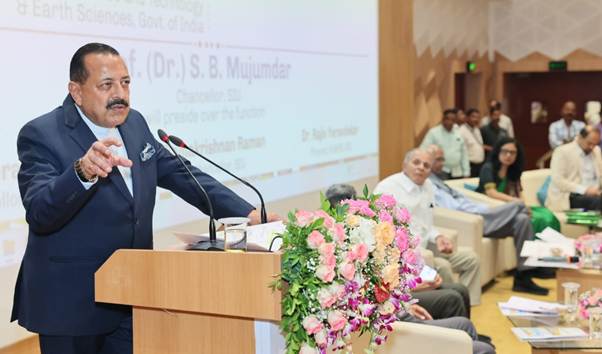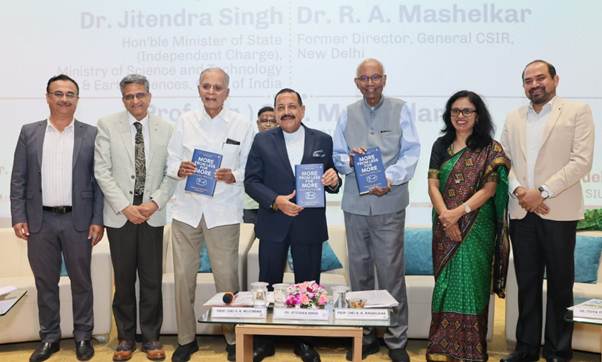Ministry of Science & Technology
India Poised for Bio-Driven Future Economy, Says Dr. Jitendra Singh at Symbiosis Conference
Holistic Healthcare and Startups Key to 2047 India, Minister Stresses
Biotech–Space Collaboration Opens New Frontiers in Medicine
Posted On:
19 SEP 2025 5:44PM by PIB Delhi
PUNE September 19: Union Minister of State (Independent Charge) for Science and Technology; Earth Sciences and Minister of State for PMO, Department of Atomic Energy, Department of Space, Personnel, Public Grievances and Pensions, Dr. Jitendra Singh, underlined that biotechnology will be the key driver of India’s future economy and healthcare solutions, calling it the “next industrial revolution.”
Dr. Jitendra Singh was speaking after inaugurating SYMRESEARCH 2.0: International Conference on Bioengineering for Global Health at Symbiosis International University, Pune. He said India had already established itself as a global player in biotechnology through breakthroughs such as the indigenous COVID-19 vaccine, HPV vaccine for cervical cancer prevention, the development of new antibiotics, and gene sequencing initiatives. “Future economy, in fact, belongs to biotechnology, just as the last revolution in the 1990s was driven by information technology,” he noted.
Highlighting government initiatives, he pointed to the launch of the Bio-E3 policy—biotechnology for environment, economy, and employment—which, he said, is aimed at creating sustainable solutions and jobs for India’s growing youth population. He added that India’s biotech sector has grown from USD 10 billion in 2014 to USD 130 billion today, with targets to reach USD 300 billion in the next five to seven years.
Dr. Jitendra Singh also underlined India’s growing engagement with space–biotech research, citing experiments by astronaut Shubhanshu Sharma on the International Space Station which studied muscle wasting, the cognitive effects of electronic gadgets, and the growth of algae and proteins in microgravity. He said these initiatives, which led to an MoU between the Department of Biotechnology and the Department of Space, point to the emergence of new fields such as space medicine.
Emphasising the need for holistic healthcare, the Minister noted that the COVID-19 pandemic had reinforced the value of integrating traditional Indian systems of medicine with modern science, as doctors worldwide looked to Ayurveda and homoeopathy during the crisis. He also called for nurturing a skilled workforce through startups and entrepreneurship in life sciences, describing biotechnology as a sector that could generate both jobs and innovation. Prevention, he stressed, must remain a priority, guided by the “three A’s” formula—awareness, accessibility, and affordability of screening.
Pointing to policy-driven achievements such as the HPV vaccine, India’s first indigenous antibiotic, and large-scale tuberculosis gene sequencing trials, Dr. Jitendra Singh said these milestones showed that India was now contributing not just to its own health needs but also to global medical progress.
Addressing the changing health landscape, Dr. Jitendra Singh observed that India faces the dual challenge of tackling communicable diseases like tuberculosis while also witnessing a rise in lifestyle-related disorders such as diabetes and fatty liver among younger populations. He underlined the importance of awareness and preventive care to preserve the energies of India’s youth, who will be the “torchbearers of 2047 India.”
On the integration of technology and healthcare, Dr. Jitendra Singh shared his ministry’s experiment with AI-driven mobile health clinics, which provide hybrid medical consultations combining physical and AI doctors, including regional language interfaces for rural patients. He also called for greater synergy between public and private sectors, as well as between traditional knowledge and modern medicine, citing lessons from the pandemic.
Concluding his address, the Minister urged students and researchers to take advantage of the flexibility provided under the National Education Policy (NEP) 2020, pursue interdisciplinary studies, and align their work with national priorities in science and technology.


*****
NKR/PSM
(Release ID: 2168574)
Visitor Counter : 315